Related Research Articles
Windows Media Audio (WMA) is a series of audio codecs and their corresponding audio coding formats developed by Microsoft. It is a proprietary technology that forms part of the Windows Media framework. WMA consists of four distinct codecs. The original WMA codec, known simply as WMA, was conceived as a competitor to the popular MP3 and RealAudio codecs. WMA Pro, a newer and more advanced codec, supports multichannel and high-resolution audio. A lossless codec, WMA Lossless, compresses audio data without loss of audio fidelity. WMA Voice, targeted at voice content, applies compression using a range of low bit rates. Microsoft has also developed a digital container format called Advanced Systems Format to store audio encoded by WMA.
The Nomad was a range of digital audio players designed and sold by Creative Technology Limited, and later discontinued in 2004. Subsequent players now fall exclusively under the MuVo and ZEN brands.

Cowon Systems, Inc. is a South Korean consumer electronics and software corporation. The company’s initial focus was software development and microelectronics, specializing in speech synthesis and speech recognition technology. In 2000, with the introduction of the iAUDIO CW100, Cowon expanded into the portable media player industry, which is now the core of their business.
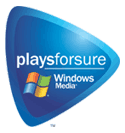
Microsoft PlaysForSure was a certification given by Microsoft to portable devices and content services that had been tested against several hundred compatibility and performance requirements. These requirements include codec support, digital rights management support, UI responsiveness, device performance, compatibility with Windows Media Player, synchronization performance, and so on. PlaysForSure certification was available for portable media players, network-attached digital media receivers, and media-enabled mobile phones. The PlaysForSure logo was applied to device packaging as well as to online music stores and online video stores.

Rockbox is a free and open-source software replacement for the OEM firmware in various forms of digital audio players (DAPs) with an original kernel. It offers an alternative to the player's operating system, in many cases without removing the original firmware, which provides a plug-in architecture for adding various enhancements and functions. Enhancements include personal digital assistant (PDA) functions, applications, utilities, and games. Rockbox can also retrofit video playback functions on players first released in mid-2000. Rockbox includes a voice-driven user-interface suitable for operation by visually impaired users.

A portable media player (PMP) or digital audio player (DAP) is a portable consumer electronics device capable of storing and playing digital media such as audio, images, and video files. The data is typically stored on a compact disc (CD), Digital Versatile Disc (DVD), Blu-ray Disc (BD), flash memory, microdrive, SD cards or hard disk drive; most earlier PMPs used physical media, but modern players mostly use flash memory. In contrast, analogue portable audio players play music from non-digital media that use analogue media, such as cassette tapes or vinyl records.
Archos is a French multinational electronics company that was established in 1988 by Henri Crohas. Archos manufactures tablets, smartphones, portable media players and portable data storage devices. The name is an anagram of Crohas' last name. Also, in Greek (-αρχος), it's a suffix used in nouns indicating a person with power. The company's slogan has been updated from "Think Smaller" to "On The Go", and the current "Entertainment your way".
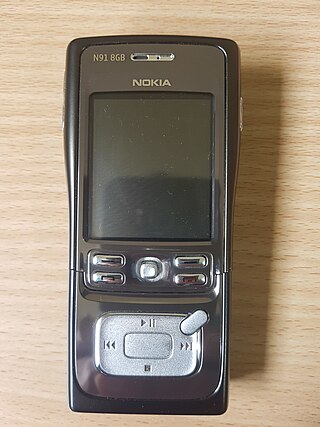
The Nokia N91 is a mobile phone produced by Nokia as part of their Nseries line of portable devices. It was announced on April 27, 2005 along with N70 and N90 as the first three Nseries devices. The N91 ran on Symbian-based S60 3rd Edition. It was the first ever phone encompassing a 4 GB internal hard drive, allowing storage for 3,000 songs. The N91 is highly focused on music. with dedicated music keys on the front which slide down to reveal the keypad. It also featured the industry-standard 3.5 mm headphone jack, and was anticipated as a major challenger to Apple, whose iPod dominated the industry. The design of the N91 is based on stainless steel with a matte finish.
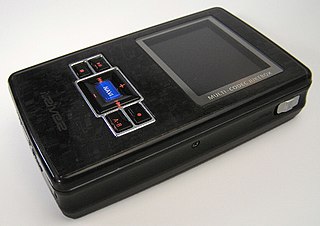
The iRiver H300 series are a series of portable audio players developed by iRiver, made up of the iRiver H320 and H340 models. They were first announced on September 22, 2004 replacing the H100/iHP-100. Each can play music, transfer pictures directly from digital cameras and UMS-compatible devices, such as flash drives, and display digital images on a colour screen. In the United States, the H320 initially retailed for $329 and the H340 was $429.

Yepp was Samsung Electronics' digital audio player brand until Samsung decided to retire most of their family brands in February 2011. From then on, their MP3 players were simply branded "Samsung" worldwide until they discontinued all of them in late 2013. The brand included a wide range of hard-drive based as well as flash-memory based players. The name is claimed to be an acronym for "young, energetic, passionate person".

Zune was a brand of digital media products and services that was marketed by Microsoft from November 2006 until it was discontinued in June 2012. Zune consisted of a line of portable media players, a music subscription service known as Zune Music Pass plus Zune Marketplace for music, TV and movies, streaming services for the Xbox 360 game console, and the Zune software media player for Windows PCs which also acted as desktop sync software for Windows Phone.
The following comparison of portable media players compares general and technical information for important digital playback devices.
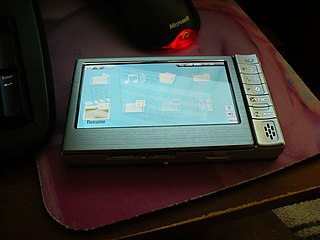
Archos Generation 4 were a series of Archos portable media players released from 2006 through 2007. The Generation 4 series is an upgrade to the previous AV and Gmini series, primarily the AV500s. There are 8 models in all. All players are Microsoft PlaysForSure compatible.
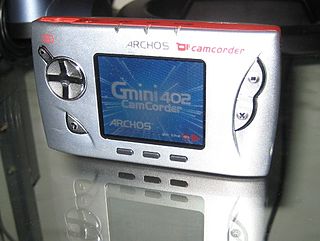
The Gmini is a series of portable audio and video players released by Archos in 2004 and 2005.
The Samsung T10 is a flash memory based Yepp portable media player produced and developed by Samsung Electronics. As the newest player of the T series, the T10 abandons using the controls of the T9, but adapts the K3's.
The French consumer electronics company Archos manufactured a number of products which have since been discontinued.

The Samsung YP-R0 is a portable media player made by Samsung, leaked on August 10, 2009 and first released end of October 2009 in Russia. It was developed along with the YP-R1 with which it shares several specifications . The R0 is available in three different Flash memory capacities: 4 GB, 8 GB, and 16 GB. It comes in three different colors: black, silver and pink. Storage is expandable via a microSDHC slot with capacity up to 32 GB, and unofficially to 64 GB or more via FAT32 formatted SDXC cards. It features an aluminum case, a 2.6 inch TFT LCD display with a resolution of 240 by 320 pixels, RDS FM tuner, tactile buttons and microUSB connector. Several EQ and sound effects are available through Samsung's DNSe 3.0 sound engine.
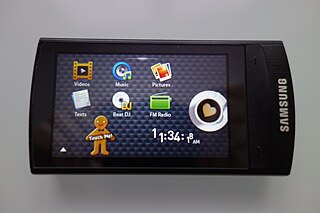
The Samsung YP-R1 is a portable media player made by Samsung, first leaked on the webshop play.com on June 14, 2009 and then released at the end of September 2009. It was developed along with the YP-R0 with which it shares several specifications . The R1 is available in four different Flash memory capacities: 4 GB, 8 GB, 16 GB and 32 GB. It comes in three different colors: black, silver and pink. It features an aluminum case, a 2.6 inch TFT LCD capacitive touchscreen with a resolution of 240 by 400 pixels, a RDS FM tuner, bluetooth and a proprietary USB connector. Several EQ and sound effects are available through Samsung's DNSe 3.0 sound engine.
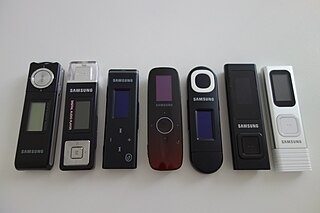
The Samsung Yepp U series is a line of USB key MP3 players made by Samsung and introduced in 2005 with the YP-U1. Samsung used to release a new device every year. Only the YP-U7 was released two years after the U6. It is the largest and most durable Yepp series. The most famous competitor is the Sony Walkman B series. In South Korea, the iRiver T series is also a main competitor.
References
- ↑ Greene, Thomas (2006-09-05). "Judge blasts MS bid to monopolize music devices". The Register . Retrieved 2007-01-05.